For the next few days, Berlin will once again be dominated by international film. Axel Schock has already picked out the first highlights from the Berlinale's mammoth programme
Most visitors to the Berlinale, regardless of whether they are there for business or pleasure, are faced with the same problem: so many films and far too little time. Over the ten days of the festival, there are no fewer than 400 different films to see in around 1,000 cinema screenings. This can make the choice an agonising one and it's easy to lose track. Here is a quick overview through rose-coloured glasses:
Aids is only a marginal theme of the festival
According to our initial research, anyone interested in the topic of HIV and Aids will see surprisingly little this year. Only the 18-minute short feature film "O Pacote" in the "Generation 14plus" section addresses life with the virus. In this Brazilian production, two schoolboys find each other. But before this can become a perhaps great love, Jefferson has to tell Leandro, who has just moved in, that he is HIV-positive.
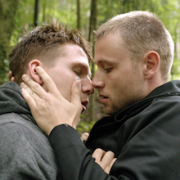
There are traditionally more gay and lesbian stories in the Berlinale programme than at any other major international film festival. In 2013, around 30 premieres and first screenings have the chance to be honoured with a Teddy Award, the Berlinale's queer film prize.
The debut film "Freier Fall" (Free Fall), a film about the KindThe abbreviation ART stands for antiretroviral therapy. - It refers to the treatment of an HIV infection with special medication that prevents the... Mehr "Summer Storm" for adults. Police officer and father-to-be Marc unexpectedly falls in love with his colleague Kay, completely upsetting both their lives. The way the lead actors Max Riemelt and Hanno Koffler play their hearts out here is a stunner, and how uninhibitedly and credibly they let the audience share in their passion is a pleasant surprise.
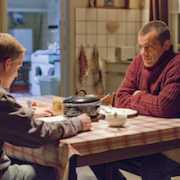
The second favourite for best queer feature film is Nanouk Leopold's screen adaptation of the Dutch bestseller "It's Quiet Upstairs" by Gerbrand Bakker. Helmer, a strapping farmer in his mid-fifties, is left to his own devices to look after the family farm. His father is dying, but between the two taciturn men stands a wall of silence, unspoken accusations and latent contempt. The withdrawn Helmer is unable to deal with the timid, ultimately unmistakable advances of a seasoned milk driver and a young labourer. In this very soberly narrated film, it only gradually emerges from casual allusions why. In the leading role: gay theatre and film star Jeroen Willems, who died unexpectedly of heart failure in December.
Nocturnal adventures
In the Korean drama "Baek Ya" (White Night), a secret also puts a strain on a gay man's ability to love and live. Flight attendant Won-gyu has returned to his hometown of Seoul and really just wants to have an unproblematic one-night stand. But instead of ending up in bed with his online date, the two drift indecisively through the night - until they arrive at the place where Won-gyu was the victim of a serious homophobic attack.
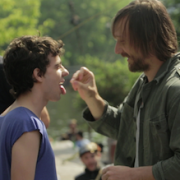
The sex adventure of a Spanish party tourist in sex- and drug-fuelled Berlin also takes an unforeseen turn. Luis staggers through the city's in-locations and falls in love with a dodgy Ukrainian. Stefan Westerwelle ("Detlef") and Patrick Schuckmann have packed everything into their feature film debut "Lose your Head" that currently attracts young people from half the world to Berlin. They have captured the attitude to life of this generation seeking multisexual adventure, freedom and freedom from boundaries in atmospheric scenes, although the plot has slipped away a little.
The joint project between Hollywood star James Franco and gay filmmaker Travis Mathews has generated a lot of hype even before filming began. They had announced their intention to recreate the 40 minutes of hardcore sex scenes that were allegedly filmed for William Friedkin's 1980 thriller "Cruising" but subsequently destroyed. In "Interior. Leather Bar", they approach this myth on a double meta-level, show the filming of their re-enactment, have gay leather guys and heterosexual actors meet for explicit sex scenes and discuss the fears of the actors that their involvement in this film might lead to them being arrested for gayGay refers to men who are romantically and/or sexually attracted to men. Important facts about the term: - "Gay" is the term used to... Mehr to be held.
Sex and society
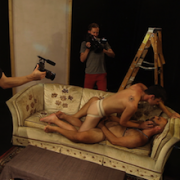
On Thursday, 14 February, the Berlinale Talent Campus will focus on how to bring sex to the screen in an authentic and pleasurable way and at the same time discuss issues of gender and sexual orientation in the face of different social norms and taboos. At the public event, which is supported by Deutsche AIDS-Hilfe "Some Like It Hot - The Power of Sex" (5 pm, HAU 1) filmmakers, writers and actors Hagar Ben Asher ("The Slut") and John Cameron Mitchell ("Shortbus") will talk about how they brought the topic of sex to the screen to not only titillate audiences but also criticise society at the same time.
And while we're on the subject of sex and pornography: Both are known to lead to addiction. This is the subject of "Don Jon's Addicton" (directed by and starring Joseph Gordon-Levitt). The attractive Jon successfully hooks up with no less attractive women using the same old trick, but without this sex actually satisfying him. The women in the porn films he watches every day are simply hotter for him. There has probably never been such an entertaining educational lesson about how pornography works in the cinema. A thoroughly stimulating and above all very amusing film for people of all genders and sexual orientations.
Sex and other addictions
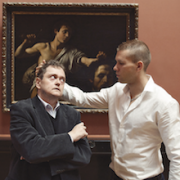
An addiction of a very different kind KindThe abbreviation ART stands for antiretroviral therapy. - It refers to the treatment of an HIV infection with special medication that prevents the... Mehr In "Naked Opera", a Luxembourg businessman does the same: he travels around the world to see "Don Giovanni" at least once a week in opera houses from Venice to Paris, usually accompanied by a luxury escort or porn star. The amazing thing about Angela Christlieb's rather entertaining documentary is that as unsympathetic as this snobbish egomaniac may seem at first, over time you almost grow a little fond of this orderly fanatic with his consistent way of life.
The festival programme also includes some very differently styled portraits of artists. In his rather conventional documentary "Paul Bowles: The Cage Door is Always Open", Daniel Young takes a closer look at the life and work of the homosexual writer and composer. He interviewed Bernardo Bertolucci, John Waters and Gore Vidal, among others.
Artist portraits
For "Fifi Howls from Happiness", a young Iranian documentary filmmaker has tracked down an emigrated artist from her country who was thought to have disappeared. Bahman Mohassess, once a celebrated sculptor and painter in his country, gives an interview in Paris and challenges both the filmmaker and the audience with his bold stance on his homosexuality and his extremely self-confident artistic self-image.
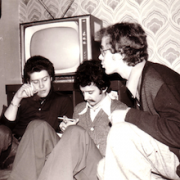
The documentary film "Born this Way" reports on the situation of gays and lesbians in Cameroon. In no other country in the world are so many people arrested because of their homosexuality as in the Central African state. The two young men who tell filmmakers Shaun Kadlec and Deb Tullmann about their situation face five years in prison. Like many other gay men, they dance to Rihanna and love Lady Gaga's song "Born this Way". But like the lesbian couple accused of "witchcraft", who are also portrayed in the film, they can only dream of the tolerance invoked there.
Honour for Praunheim
Filmmaker Sébastian Lifshitz presents "Bambi", a documentary about the now 77-year-old transsexual cabaret artist Marie-Pierre, while Jochen Hick and Andreas Strohfeld tell amazing, touching and illuminating stories from the lives of homosexuals in the GDR in "Out in East Berlin".
It remains to be seen whether and which awards the makers of these films will be able to take home at the end of the Berlinale. Rosa von Praunheim, on the other hand, can already clear a place in his trophy collection at home. Although he is not bringing a new film to the festival, he will be honoured with the Berlinale Camera for his life's work.
More information about the queer films at the festival, the Teddy Award ceremony and the extensive supporting programme can be found at teddyaward.tv.
More information about the Berlin Film Festival, the programme and advance ticket sales at www.berlinale.de.
